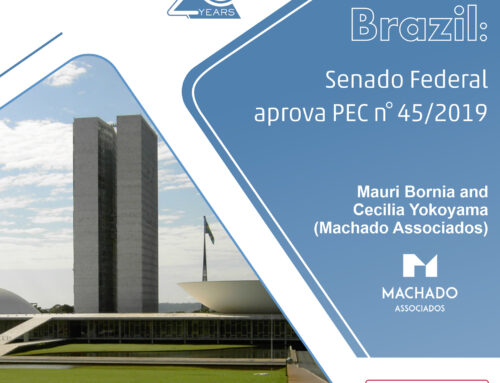Tax Report March 2020
Entry into force of Law 21,210 on modernization of Chilean tax law.
The new law No. 21,210 published in February 2020, includes a series of modifications to different tax laws in force in Chile. We list, as a summary, some of the main changes introduced:
I.- Income tax
1.1.- New first category tax regimes (corporative tax).
With the tax reform, new tax regimes come into effect as of January 1, 2020.
Although the change of these regimes was made automatically, taxpayers have until April 30, 2020 to change their regimes.
The new regimes are:
A. General Regime (Semi Integrated). Regime focused on large companies.
Aimed at: Taxpayers whose annual average income exceeds UF 75,000 , or do not meet any of the requirements to qualify for the SME (Small and Medium Enterprises) regime.
Accounting: They are required to keep a complete accounting.
First category tax Rate: 27%.
Credit: The first category tax may be charged at 65% against final taxes.
Base: The owners of the company will be taxed based on effective withdrawals or distributions.
* The obligation of restitution to the taxpayers of Withholding Tax, is extended until December 31, 2026. This applies to the residents in countries with which Chile has signed an agreement to avoid double taxation, before January 1, 2020. (case of the United States).
B. Pro-SME Regime.
Aimed at: Taxpayers who meet the following requirements:
i. An average annual gross income that does not exceed UF 75,000, regardless of the type of company.
ii. At the time of setting up a company and starting activities its effective capital must not exceed 85,000 UF.
iii. That the following income do not to exceed 35% of the total income:
– Income from numbers 1 and 2 of article 20 of the LIR. That is, income from exploitation of real estate, with the exception of agricultural real estate, and income from movable capital.
– Contracts on joint accounts.
– Social rights, shares or quotas of investment funds.
Accounting: It will have complete accounting, but taxpayers can choose to declare according to simplified accounting.
Corporate tax rate: 25% that may be imputed 100% against final taxes.
Base: Owners are taxed based on effective withdrawals.
C. Transparent Pro-SME Regime.
In this regime, the owners are taxed directly with the IGC (personal income tax) rate that affects them.
Aimed at: SMEs that have owners who pay final taxes, that is, individuals with or without domicile or residence in Chile, or legal persons without domicile or residence in Chile.
Accounting: It will have simplified accounting based on income received and expenses paid, but taxpayers can choose to declare according to complete accounting.
First category tax rate: Not affected by the first category tax.
Taxation of owners: They will be affected based on the result obtained by the company directly with the final taxes in the same year, in the proportion that corresponds to each partner.
D.- Other regimes:
– The Presumptive Income Regime for agricultural, transport and mining activities is maintained as long as it does not exceed the limits established for each activity.
– Regime for Taxpayers not subject to Article 14 of the Income Tax Law. Regime that applies to corporations or foundations in Chile, since it applies to taxpayers whose owners are not subject to final taxes.
1.2.- Complementary Global Tax (Personal Income Tax).
– A new 40% tax tranche is established for the portion of income that exceeds 310 UTM .
In any case, the maximum effective rate will be limited to 44.45%, for which the 40% tranche, subject to taxation in the first category under the General Regime (Semi-integrated), will receive a credit of 5% on that part of withdrawals and dividends exceeding 310 UTA .
The 40% rate will be applicable as well for second category income that is in the same section.
1.3.- Other modifications in the Law on Income Tax.
– The concepts of:
• Permanent establishment: a legal definition of the concept is made in line with the OECD and the elements established in the administrative jurisprudence of the Chilean IRS.
• Tax equity: It is defined as the set of assets, rights and obligations, at tax values, that a company has.
– The concept of ‘necessary expenses’ is defined as those expenses able to generate income in the same or future financial years and are relate to the interest, development or maintenance of the business line.
– The deduction of expense by contractual penalty clause is accepted.
– Regarding the absorption of the tax loss, the PPUA refund will be gradually eliminated. This means that companies that maintain a tax loss will no longer be able to absorb the loss after 5 years.
– Among others.
II.- Modifications to the VAT law.
A series of modifications were made to the VAT law, including:
– The presumption of regularity is eliminated when the sale of a real estate occurs before one year from its acquisition. At the same time, the presumption of regularity for taxpayers with a real estate business is eliminated.
– The tax on certain digital services provided by persons domiciled or residing abroad is taxed with said tax.
– The regulations on early repayment of tax credit of 27 bis are amended.
– The VAT exemption is modified for services taxed with Withholding Tax.
– Among others.
III.- Territorial Tax Law (Real State tax).
– A land tax surcharge calculated on the total tax assessment is established in the part that exceeds 670 UTA .
Regarding the tax base of said surcharge, the total tax assessment is comprised of the sum of the tax assessments of each of the taxpayer’s real estate. For those real estate without a residential destination, only the proportion that is not exempt will be considered for the calculation of the total tax assessment.
Applicable rate: Progressive in three tranches of 0.075%, 0.15% and 0.275%.
Accrual and payment of the surcharge: This surcharge will accrue annually on January 1st, considering the real estate registered in the Property Register (‘Conservador de Bienes Raíces’) on behalf of the taxpayer on December 31 of the previous year.
The transfer and payment of the surcharge will be made at the same time applicable to the land tax.
IV. Law on Inheritance Tax, Allocations and gift tax.
– The concept of gift is defined.
– The double taxation of the heirs of the survivor who dies within 5 years of the death of his spouse or civil survivor is eliminated.
– Tax reduction to assignees or grantee registered in the National Registry of Disability.
– Establishes new exemptions to gift made by individuals.
– It frees from the Chilean procedure of insinuation (‘insinuación’) to certain assignments and exempt gifts, that are carried out by public limited companies, with requirements.
– Add the deferral of the tax payment for up to three years.
– Among others.
V.- Tax Code.
– An administrative complaint resource is established, in case of violation of the rights of taxpayers.
– The out-of-court settlement is established at the taxpayer’s request, regulating its procedure.
– A series of aspects is established to strengthen the taxpayer, among others.
VI.- International standards.
– Elimination of VAT exemption for the transfer of standard software license used in Chile, owned by a foreign company. Services rendered abroad and utilized in Chile are subject to a 19% VAT unless they are effectively subject to the withholding tax of article 59 of the Chilean Income Tax Law.
– The exemplary list of the ‘physical medium’ is eliminated of subsection 1 of article 59. This is, in which the software may be contained (cassette, floppy disk, disk, magnetic tape) and it is replaced by the expression ‘on a physical or intangible medium’.
– Regarding the taxation of interests with the 4% rate:
• For its origin, the credit must not be granted through an agreement structured in such a way that a third party abroad, who is not entitled to the reduced rate, indirectly receives the payment of interest (back to back credits).
• A foreign or international financial institution is defined.
• The obligation for the payer to inform the Chilean IRS of the operation conditions is established.
– Article 59 bis is added: Income from digital services provided in the terms of the new article 8 letter n) of the LIVS is exempt from the Withholding tax, in case that they come from individuals exempt from VAT.
– The rules on foreign tax credit is reformulated.
VII.- Other relevant modifications.
– The taxpayer’s defense office (DEDECON) is created.
– A substitute tax is established for the FUT with a rate of 30%
Glossary of terms
IDPC: First Category Tax.
IGC: Complementary global tax (Chilean Personal Income Tax).
IA: Withholding tax.
LIR: Law on income tax.
LVIS: Law on Sales and Service Taxes.
UTM: monthly tax unit.
UTA: Annual tax unit.
PPUA: Provisional payment for absorbed profits.
FUT: Taxable profits fund.
Indicators (all calculated on March 2020):
– USD$ 1 (U.S. currency) = CL$ 852.06 (Chilean currency).
– UF 1 (development unit) = CL$ 28,531.25 (Chilean daily readjusted value, that varies according to the CPI on a monthly basis).
– UTM 1 (monthly tax unit) = CL$ 50,021 (Chilean monthly readjusted value).
– UTA 1 (annual tax unit) = CL$ 600,252 (Chilean yearly readjusted value).
Contact
EGB Abogados
Av. Vitacura 2939, Of. 2202
Las Condes – Santiago
Telephone: (56 2) 5921300
Email: Contacto@egybabogados.com
www.egybabogados.com





